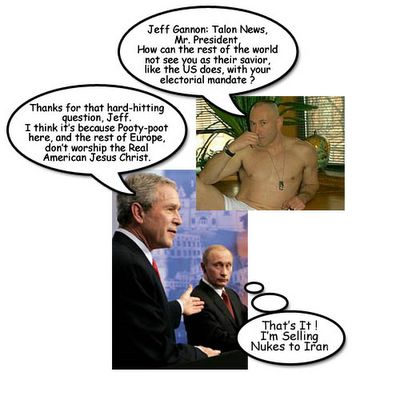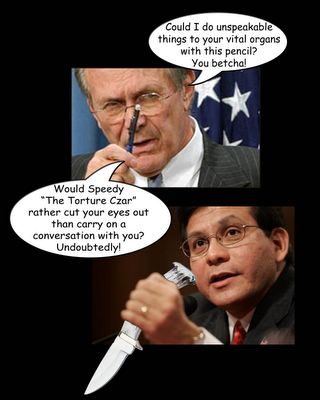2.28.2005
A Lovely Bush Childhood Antidote
"We were terrible to animals," recalled [Bush pal Terry] Throckmorton, laughing. A dip behind the Bush borne turned into a small lake after a good rain, and thousands of frogs would come out. "Everybody would get BB guns and shoot them," Throckmorton said. "Or we'd put firecrackers in the frogs and throw them and blow them up."
"We were terrible to animals," recalled [Bush pal Terry] Throckmorton, laughing. A dip behind the Bush borne turned into a small lake after a good rain, and thousands of frogs would come out. "Everybody would get BB guns and shoot them," Throckmorton said. "Or we'd put firecrackers in the frogs and throw them and blow them up."
2.24.2005
2.22.2005
2.15.2005
Complete "Jeff Gannon" story- I guess finding a moral shill is harder than it looks
Bush prefers Martin spokesman to his own because of "pretty face"
by Jane Taber, Globe and Mail
Ottawa — This is the tale of the two Scotts — one American, the other Canadian. One is dark-haired, the other blond. Both are 35 and both work for the most powerful men in their respective countries.
Scott McClellan is the press secretary to U.S. President George W. Bush; Scott Reid is the senior strategist to Prime Minister Paul Martin.
But, according to Mr. Bush, Mr. Martin has the prettier Scott.
Indeed. Welcome to a new era of “pretty face” Canada-U.S. relations.
This is what happened:
Mr. Bush met Mr. Reid earlier this week at the summit in Monterrey, Mexico, just after the President's breakfast with Mr. Martin.
Mr. Reid was not initially in the hotel room where the two leaders and their closest advisers met, but was called in to brief the Prime Minister at the end as the group waited for the media.
Mr. Bush wandered over during Mr. Reid's chat with the Prime Minister. Mr. Reid introduced himself and shook hands with Mr. Bush.
“Well, what do you do for this guy?” the President asked as he pointed to the Prime Minister.
“Well, you know, sir, I can't really say,” Mr. Reid said. “It's not that I don't want to. It's just that, you know, I don't really know from day to day.”
This is true. Mr. Reid handles a number of files and performs a number of different duties, depending on the issue and the day.
The President chuckled. “Well, you got a pretty face,” he told the surprised Mr. Reid. He wasn't done. “You got a pretty face,” he said again. “You're a good-looking guy. Better looking than my Scott anyway.”
This is true. His Scott has a receding hairline and is on the chubby side, while Mr. Martin's Scott has a full head of hair and is quite fit.
For the first time in his life, Mr. Reid had no reply. “I didn't know what to say,” said Mr. Reid, noting later that he wished that Mr. Bush had referred to him as a “rugged-looking young man or something.
“But I'll take what I can, I guess,” he joked. “When a Texas Republican says you've got a pretty face, then I guess there is just no way around it
by Jane Taber, Globe and Mail
Ottawa — This is the tale of the two Scotts — one American, the other Canadian. One is dark-haired, the other blond. Both are 35 and both work for the most powerful men in their respective countries.
Scott McClellan is the press secretary to U.S. President George W. Bush; Scott Reid is the senior strategist to Prime Minister Paul Martin.
But, according to Mr. Bush, Mr. Martin has the prettier Scott.
Indeed. Welcome to a new era of “pretty face” Canada-U.S. relations.
This is what happened:
Mr. Bush met Mr. Reid earlier this week at the summit in Monterrey, Mexico, just after the President's breakfast with Mr. Martin.
Mr. Reid was not initially in the hotel room where the two leaders and their closest advisers met, but was called in to brief the Prime Minister at the end as the group waited for the media.
Mr. Bush wandered over during Mr. Reid's chat with the Prime Minister. Mr. Reid introduced himself and shook hands with Mr. Bush.
“Well, what do you do for this guy?” the President asked as he pointed to the Prime Minister.
“Well, you know, sir, I can't really say,” Mr. Reid said. “It's not that I don't want to. It's just that, you know, I don't really know from day to day.”
This is true. Mr. Reid handles a number of files and performs a number of different duties, depending on the issue and the day.
The President chuckled. “Well, you got a pretty face,” he told the surprised Mr. Reid. He wasn't done. “You got a pretty face,” he said again. “You're a good-looking guy. Better looking than my Scott anyway.”
This is true. His Scott has a receding hairline and is on the chubby side, while Mr. Martin's Scott has a full head of hair and is quite fit.
For the first time in his life, Mr. Reid had no reply. “I didn't know what to say,” said Mr. Reid, noting later that he wished that Mr. Bush had referred to him as a “rugged-looking young man or something.
“But I'll take what I can, I guess,” he joked. “When a Texas Republican says you've got a pretty face, then I guess there is just no way around it
2.14.2005
2.11.2005
The Official Site on Rebuilding Iraq FAQ
2.10.2005
Fake News Organization’s Reporter Quits
Fake White House reporter Jeff Gannon, allegedly the only “reporter” to have access to an internal CIA memo that named covert CIA agent Valerie Plame, is calling it quits after controversy surrounding how he possessed the kind of access to the memo that no reporter from any news organization had. On his website, Gannon writes, “Because of the attention being paid to me I find it is no longer possible to effectively be a reporter for Talon News. In consideration of the welfare of me and my family I have decided to return to private life.” Gannon, who is known to ask loaded questions during White House press briefings, worked for Talon News, a news agency in “name only,” as blogger Kos revealed. Talon News has no real newsroom or office and consists of “volunteer reporters” directed by an editor-in-chief named Bobby Eberle, who distributes most of the stories through his other organization (where he is president and CEO) called GOPUSA. Eberle and his wife live in Texas, where they are heavily involved in conservative politics.
Fake White House reporter Jeff Gannon, allegedly the only “reporter” to have access to an internal CIA memo that named covert CIA agent Valerie Plame, is calling it quits after controversy surrounding how he possessed the kind of access to the memo that no reporter from any news organization had. On his website, Gannon writes, “Because of the attention being paid to me I find it is no longer possible to effectively be a reporter for Talon News. In consideration of the welfare of me and my family I have decided to return to private life.” Gannon, who is known to ask loaded questions during White House press briefings, worked for Talon News, a news agency in “name only,” as blogger Kos revealed. Talon News has no real newsroom or office and consists of “volunteer reporters” directed by an editor-in-chief named Bobby Eberle, who distributes most of the stories through his other organization (where he is president and CEO) called GOPUSA. Eberle and his wife live in Texas, where they are heavily involved in conservative politics.
2.09.2005
2.07.2005
Bush Budget Targets Poor and Vulnerable
Today President Bush sends a budget to Congress that, despite record spending of about $2.5 trillion, "calls for billions of dollars in cuts that will touch people on food stamps and farmers on price supports, children under Medicaid and adults in public housing."
About one third of the of the programs being targeted for elimination are in the Education Department, "including federal grant programs for local schools in such areas as vocational education, supporting drug-free schools and Even Start, a $225 million literacy program." Spending on the military, the biggest part of discretionary spending, is on target to rise by 4.8 percent in 2006 to $419.3 billion.
Today President Bush sends a budget to Congress that, despite record spending of about $2.5 trillion, "calls for billions of dollars in cuts that will touch people on food stamps and farmers on price supports, children under Medicaid and adults in public housing."
About one third of the of the programs being targeted for elimination are in the Education Department, "including federal grant programs for local schools in such areas as vocational education, supporting drug-free schools and Even Start, a $225 million literacy program." Spending on the military, the biggest part of discretionary spending, is on target to rise by 4.8 percent in 2006 to $419.3 billion.
2.04.2005
2.03.2005
The Truth about Social Security Privatization-from economist:PAUL KRUGMAN
-NY Times
The fight over Social Security is, above all, about what kind of society we want to have. But it's also about numbers. And the numbers the privatizers use just don't add up.
Let me inflict some of those numbers on you. Sorry, but this is important.
Schemes for Social Security privatization, like the one described in the 2004 Economic Report of the President, invariably assume that investing in stocks will yield a high annual rate of return, 6.5 or 7 percent after inflation, for at least the next 75 years. Without that assumption, these schemes can't deliver on their promises. Yet a rate of return that high is mathematically impossible unless the economy grows much faster than anyone is now expecting.
To explain why, I need to talk about stock returns. The yield on a stock comes from two components: cash that the company pays out in the form of dividends and stock buybacks, and capital gains. Right now, if dividends and buybacks were the whole story, the rate of return on stocks would be only 3 percent.
To get a 6.5 percent rate of return, you need capital gains: if dividends yield 3 percent, stock prices have to rise 3.5 percent per year after inflation. That doesn't sound too unreasonable if you're thinking only a few years ahead.
But privatizers need that high rate of return for 75 years or more. And the economic assumptions underlying most projections for Social Security make that impossible.
The Social Security projections that say the trust fund will be exhausted by 2042 assume that economic growth will slow as baby boomers leave the work force. The actuaries predict that economic growth, which averaged 3.4 percent per year over the last 75 years, will average only 1.9 percent over the next 75 years.
In the long run, profits grow at the same rate as the economy. So to get that 6.5 percent rate of return, stock prices would have to keep rising faster than profits, decade after decade.
The price-earnings ratio - the value of a company's stock, divided by its profits - is widely used to assess whether a stock is overvalued or undervalued. Historically, that ratio averaged about 14. Today it's about 20. Where would it have to go to yield a 6.5 percent rate of return?
I asked Dean Baker, of the Center for Economic and Policy Research, to help me out with that calculation (there are some technical details I won't get into). Here's what we found: by 2050, the price-earnings ratio would have to rise to about 70. By 2060, it would have to be more than 100.
In other words, to believe in a privatization-friendly rate of return, you have to believe that half a century from now, the average stock will be priced like technology stocks at the height of the Internet bubble - and that stock prices will nonetheless keep on rising.
Social Security privatizers usually defend their bullishness by saying that stock investors earned high returns in the past. But stocks are much more expensive than they used to be, relative to corporate profits; that means lower dividends per dollar of share value. And economic growth is expected to be slower.
Which brings us to the privatizers' Catch-22.
They can rescue their happy vision for stock returns by claiming that the Social Security actuaries are vastly underestimating future economic growth. But in that case, we don't need to worry about Social Security's future: if the economy grows fast enough to generate a rate of return that makes privatization work, it will also yield a bonanza of payroll tax revenue that will keep the current system sound for generations to come.
Alternatively, privatizers can unhappily admit that future stock returns will be much lower than they have been claiming. But without those high returns, the arithmetic of their schemes collapses.
It really is that stark: any growth projection that would permit the stock returns the privatizers need to make their schemes work would put Social Security solidly in the black.
And I suspect that at least some privatizers know that. Mr. Baker has devised a test he calls "no economist left behind": he challenges economists to make a projection of economic growth, dividends and capital gains that will yield a 6.5 percent rate of return over 75 years. Not one economist who supports privatization has been willing to take the test.
But the offer still stands. Ladies and gentlemen, would you care to explain your position?
Originally published in The New York Times, 2.1.05
-NY Times
The fight over Social Security is, above all, about what kind of society we want to have. But it's also about numbers. And the numbers the privatizers use just don't add up.
Let me inflict some of those numbers on you. Sorry, but this is important.
Schemes for Social Security privatization, like the one described in the 2004 Economic Report of the President, invariably assume that investing in stocks will yield a high annual rate of return, 6.5 or 7 percent after inflation, for at least the next 75 years. Without that assumption, these schemes can't deliver on their promises. Yet a rate of return that high is mathematically impossible unless the economy grows much faster than anyone is now expecting.
To explain why, I need to talk about stock returns. The yield on a stock comes from two components: cash that the company pays out in the form of dividends and stock buybacks, and capital gains. Right now, if dividends and buybacks were the whole story, the rate of return on stocks would be only 3 percent.
To get a 6.5 percent rate of return, you need capital gains: if dividends yield 3 percent, stock prices have to rise 3.5 percent per year after inflation. That doesn't sound too unreasonable if you're thinking only a few years ahead.
But privatizers need that high rate of return for 75 years or more. And the economic assumptions underlying most projections for Social Security make that impossible.
The Social Security projections that say the trust fund will be exhausted by 2042 assume that economic growth will slow as baby boomers leave the work force. The actuaries predict that economic growth, which averaged 3.4 percent per year over the last 75 years, will average only 1.9 percent over the next 75 years.
In the long run, profits grow at the same rate as the economy. So to get that 6.5 percent rate of return, stock prices would have to keep rising faster than profits, decade after decade.
The price-earnings ratio - the value of a company's stock, divided by its profits - is widely used to assess whether a stock is overvalued or undervalued. Historically, that ratio averaged about 14. Today it's about 20. Where would it have to go to yield a 6.5 percent rate of return?
I asked Dean Baker, of the Center for Economic and Policy Research, to help me out with that calculation (there are some technical details I won't get into). Here's what we found: by 2050, the price-earnings ratio would have to rise to about 70. By 2060, it would have to be more than 100.
In other words, to believe in a privatization-friendly rate of return, you have to believe that half a century from now, the average stock will be priced like technology stocks at the height of the Internet bubble - and that stock prices will nonetheless keep on rising.
Social Security privatizers usually defend their bullishness by saying that stock investors earned high returns in the past. But stocks are much more expensive than they used to be, relative to corporate profits; that means lower dividends per dollar of share value. And economic growth is expected to be slower.
Which brings us to the privatizers' Catch-22.
They can rescue their happy vision for stock returns by claiming that the Social Security actuaries are vastly underestimating future economic growth. But in that case, we don't need to worry about Social Security's future: if the economy grows fast enough to generate a rate of return that makes privatization work, it will also yield a bonanza of payroll tax revenue that will keep the current system sound for generations to come.
Alternatively, privatizers can unhappily admit that future stock returns will be much lower than they have been claiming. But without those high returns, the arithmetic of their schemes collapses.
It really is that stark: any growth projection that would permit the stock returns the privatizers need to make their schemes work would put Social Security solidly in the black.
And I suspect that at least some privatizers know that. Mr. Baker has devised a test he calls "no economist left behind": he challenges economists to make a projection of economic growth, dividends and capital gains that will yield a 6.5 percent rate of return over 75 years. Not one economist who supports privatization has been willing to take the test.
But the offer still stands. Ladies and gentlemen, would you care to explain your position?
Originally published in The New York Times, 2.1.05
2.02.2005
The Principles Project : Help the DNC get a voice
Audit: $9 Billion Unaccounted for in Iraq
Mon Jan 31, 4:35 PM ET
Middle East - AP
By LARRY MARGASAK, Associated Press Writer
WASHINGTON - The U.S. occupation authority in Iraq was unable to keep track of nearly $9 billion it transferred to government ministries, which lacked financial controls, security, communications and adequate staff, an inspector general has found.
The U.S. officials relied on Iraqi audit agencies to account for the funds but those offices were not even functioning when the funds were transferred between October 2003 and June 2004, according to an audit by a special U.S. inspector general.
The findings were released Sunday by Stuart Bowen Jr., special inspector general for Iraq reconstruction. Bowen issued several reports on the Coalition Provisional Authority (CPA), the U.S. occupation government that ruled Iraq from June 2003 to June 2004.
The official who led the CPA, L. Paul Bremer III, submitted a blistering, written reply to the findings, saying the report had "many misconceptions and inaccuracies," and lacked professional judgment.
Bremer complained the report "assumes that Western-style budgeting and accounting procedures could be immediately and fully implemented in the midst of a war."
The inspector general said the occupying agency disbursed $8.8 billion to Iraqi ministries "without assurance the moneys were properly accounted for."
U.S. officials, the report said, "did not establish or implement sufficient managerial, financial and contractural controls." There was no way to verify that the money was used for its intended purposes of financing humanitarian needs, economic reconstruction, repair of facilities, disarmament and civil administration.
Pentagon (news - web sites) spokesman Bryan Whitman said Sunday the authority was hamstrung by "extraordinary conditions" under which it worked throughout its mission.
"We simply disagree with the audit's conclusion that the CPA provided less than adequate controls," Whitman said.
Turning over the money "was in keeping with the CPA's responsibility to transfer these funds and administrative responsibilities to the Iraqi ministries as an essential part of restoring Iraqi governance."
The inspector general cited an International Monetary Fund (news - web sites) assessment in October, 2003 on the poor state of Iraqi government offices. The assessment found ministries suffered from staff shortages, poor security, disruptions in communications, damage and looting of government buildings, and lack of financial policies.
Some of the transferred funds may have paid "ghost" employees, the inspector general found.
CPA staff learned that 8,206 guards were on the payroll at one ministry, but only 602 could be accounted for, the report said. At another ministry, U.S. officials found 1,417 guards on the payroll but could only confirm 642.
When staff members of the U.S. occupation government recommended that payrolls be verified before salary payments, CPA financial officials "stated the CPA would rather overpay salaries than risk not paying employees and inciting violence," the inspector general said.
Bremer attacked many of the specific findings. Among his rebuttal points:
_With more than a million Iraqi families depending on government salaries, there would have been an increased security threat if civil servants had not been paid until modern pay records were developed.
_U.S. policy was to build up the Iraqi force guarding government facilities, and it was better to accept an imperfect payroll system than "to stop paying armed young men" providing security.
_The report was suggesting the CPA "should have placed hundreds of CPA auditors" in Iraqi ministries, contrary to United States and United Nations (news - web sites) policy of giving Iraqi ministers responsibility for their budgets.
_The CPA established a program review board, an independent judiciary and inspector generals in each agency to fight corruption.
The inspector general's report rejected Bremer's criticism. It concluded that despite the war, "We believe the CPA management of Iraq's national budget process and oversight of Iraqi funds was burdened by severe inefficiencies and poor management."
Mon Jan 31, 4:35 PM ET
Middle East - AP
By LARRY MARGASAK, Associated Press Writer
WASHINGTON - The U.S. occupation authority in Iraq was unable to keep track of nearly $9 billion it transferred to government ministries, which lacked financial controls, security, communications and adequate staff, an inspector general has found.
The U.S. officials relied on Iraqi audit agencies to account for the funds but those offices were not even functioning when the funds were transferred between October 2003 and June 2004, according to an audit by a special U.S. inspector general.
The findings were released Sunday by Stuart Bowen Jr., special inspector general for Iraq reconstruction. Bowen issued several reports on the Coalition Provisional Authority (CPA), the U.S. occupation government that ruled Iraq from June 2003 to June 2004.
The official who led the CPA, L. Paul Bremer III, submitted a blistering, written reply to the findings, saying the report had "many misconceptions and inaccuracies," and lacked professional judgment.
Bremer complained the report "assumes that Western-style budgeting and accounting procedures could be immediately and fully implemented in the midst of a war."
The inspector general said the occupying agency disbursed $8.8 billion to Iraqi ministries "without assurance the moneys were properly accounted for."
U.S. officials, the report said, "did not establish or implement sufficient managerial, financial and contractural controls." There was no way to verify that the money was used for its intended purposes of financing humanitarian needs, economic reconstruction, repair of facilities, disarmament and civil administration.
Pentagon (news - web sites) spokesman Bryan Whitman said Sunday the authority was hamstrung by "extraordinary conditions" under which it worked throughout its mission.
"We simply disagree with the audit's conclusion that the CPA provided less than adequate controls," Whitman said.
Turning over the money "was in keeping with the CPA's responsibility to transfer these funds and administrative responsibilities to the Iraqi ministries as an essential part of restoring Iraqi governance."
The inspector general cited an International Monetary Fund (news - web sites) assessment in October, 2003 on the poor state of Iraqi government offices. The assessment found ministries suffered from staff shortages, poor security, disruptions in communications, damage and looting of government buildings, and lack of financial policies.
Some of the transferred funds may have paid "ghost" employees, the inspector general found.
CPA staff learned that 8,206 guards were on the payroll at one ministry, but only 602 could be accounted for, the report said. At another ministry, U.S. officials found 1,417 guards on the payroll but could only confirm 642.
When staff members of the U.S. occupation government recommended that payrolls be verified before salary payments, CPA financial officials "stated the CPA would rather overpay salaries than risk not paying employees and inciting violence," the inspector general said.
Bremer attacked many of the specific findings. Among his rebuttal points:
_With more than a million Iraqi families depending on government salaries, there would have been an increased security threat if civil servants had not been paid until modern pay records were developed.
_U.S. policy was to build up the Iraqi force guarding government facilities, and it was better to accept an imperfect payroll system than "to stop paying armed young men" providing security.
_The report was suggesting the CPA "should have placed hundreds of CPA auditors" in Iraqi ministries, contrary to United States and United Nations (news - web sites) policy of giving Iraqi ministers responsibility for their budgets.
_The CPA established a program review board, an independent judiciary and inspector generals in each agency to fight corruption.
The inspector general's report rejected Bremer's criticism. It concluded that despite the war, "We believe the CPA management of Iraq's national budget process and oversight of Iraqi funds was burdened by severe inefficiencies and poor management."




























